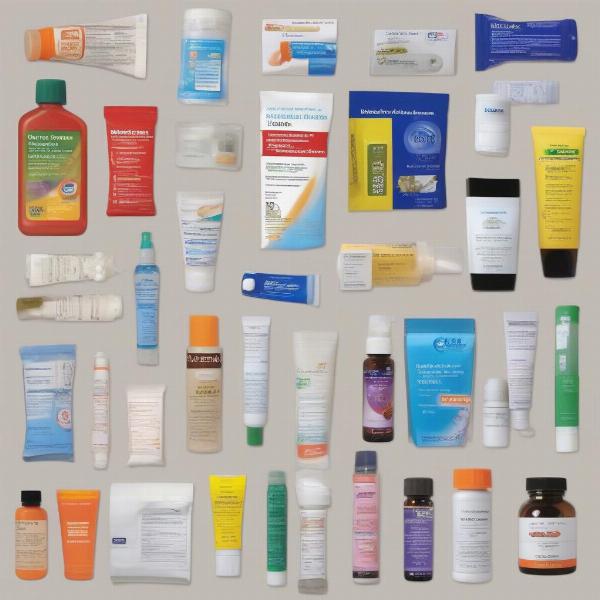Worms are a common problem for dogs in the UK, and choosing the best worm treatment can be confusing. This guide will provide you with all the information you need to understand the different types of worms, the available treatments, and how to choose the best option for your furry friend. We’ll cover everything from prevention to treatment, ensuring you’re equipped to keep your dog healthy and worm-free.
Understanding Dog Worms in the UK
Several types of worms can affect dogs in the UK, including roundworms, tapeworms, hookworms, whipworms, and lungworms. Each type has its own symptoms and requires specific treatment. Understanding the differences is crucial for effective worm control.
Types of Worms and Their Symptoms
- Roundworms: These are the most common intestinal worms in dogs, often transmitted through infected faeces or contaminated soil. Symptoms include vomiting, diarrhoea, a pot-bellied appearance, and weight loss.
- Tapeworms: These flat, segmented worms are usually transmitted through fleas. Signs of tapeworm infestation include rice-like segments in the dog’s faeces or around the anus, and scooting.
- Hookworms: These small intestinal worms can cause anaemia, bloody diarrhoea, and weight loss. They can be transmitted through contaminated soil or the mother’s milk.
- Whipworms: These worms live in the large intestine and can cause diarrhoea, weight loss, and bloody stools. They are transmitted through infected faeces.
- Lungworms: These worms live in the heart and lungs and can cause respiratory problems, such as coughing and difficulty breathing. They are transmitted through slugs and snails.
Choosing the Best Worm Treatment for Your Dog
Several worming treatments are available in the UK, including tablets, liquids, spot-ons, and pastes. The best treatment will depend on your dog’s age, weight, lifestyle, and the type of worm infestation.
Over-the-Counter vs. Prescription Treatments
Over-the-counter treatments are readily available from pet shops and pharmacies. However, for more severe infestations or specific worm types like lungworm, a prescription treatment from your veterinarian is necessary.
Popular Worming Products in the UK
Many effective worming products are available in the UK, including Drontal, Panacur, Milbemax, and Advocate. Your veterinarian can recommend the most suitable product for your dog’s specific needs.
 Popular Worming Products for Dogs in the UK
Popular Worming Products for Dogs in the UK
Worming Schedule for Dogs in the UK
Regular worming is essential for preventing worm infestations. Puppies should be wormed every two weeks from two weeks of age until they are 12 weeks old, then monthly until they are six months old. Adult dogs should be wormed at least every three months, or more frequently if they are at high risk of exposure.
Factors Affecting Worming Frequency
Factors that can increase the risk of worm infestation include hunting, scavenging, contact with other dogs, and access to areas where wildlife may defecate.
Preventing Worm Infestations
While treatment is important, prevention is always better. Here are some tips for preventing worm infestations in your dog:
- Regular worming: Follow a consistent worming schedule recommended by your veterinarian.
- Flea control: Treat your dog regularly for fleas, as fleas can transmit tapeworms. flea and tick tablets for dogs can be very effective.
- Hygiene: Pick up your dog’s faeces immediately and dispose of them responsibly.
- Avoid contaminated areas: Try to prevent your dog from scavenging or eating faeces from other animals.
When to See a Vet
If your dog is showing any signs of worm infestation, such as vomiting, diarrhoea, weight loss, or changes in appetite, consult your veterinarian immediately. They can diagnose the type of worm and recommend the most appropriate treatment. You might also consider medicated shampoos for dogs for certain skin conditions related to parasites. For targeted advice regarding fleas and ticks, refer to flea treatment for dogs uk and tick treatment for dogs uk.
Conclusion
Choosing the best worm treatment for your dog in the UK requires understanding the different types of worms, available treatments, and your dog’s individual needs. Regular worming, combined with preventative measures, is crucial for maintaining your dog’s health and well-being. Consult your veterinarian for personalized advice and recommendations on the best worm treatment for dogs uk. For information about Panacur dosage, you can check out dose of panacur for dogs.
FAQ
- How often should I worm my dog? Adult dogs should be wormed at least every three months.
- Can I buy worming tablets over the counter? Yes, many worming tablets are available over the counter, but some require a prescription.
- What are the signs of worms in dogs? Signs of worms can include vomiting, diarrhoea, weight loss, and changes in appetite.
- How can I prevent my dog from getting worms? Regular worming, flea control, and good hygiene are essential for preventing worms.
- What should I do if I think my dog has worms? Consult your veterinarian immediately for diagnosis and treatment.
- Are all worming treatments the same? No, different treatments target different types of worms.
- Can humans get worms from dogs? Yes, some types of worms can be transmitted from dogs to humans.
ILM Dog is your trusted resource for expert advice on dog care and wellbeing. We offer comprehensive information on dog breeds, health, training, nutrition, grooming, and much more. From puppy care to senior dog support, we cover every stage of your dog’s life. Learn more about our services and connect with our experts at [email protected] or +44 20-3965-8624. ILM Dog is dedicated to providing you with the knowledge and resources you need to be the best dog owner you can be.